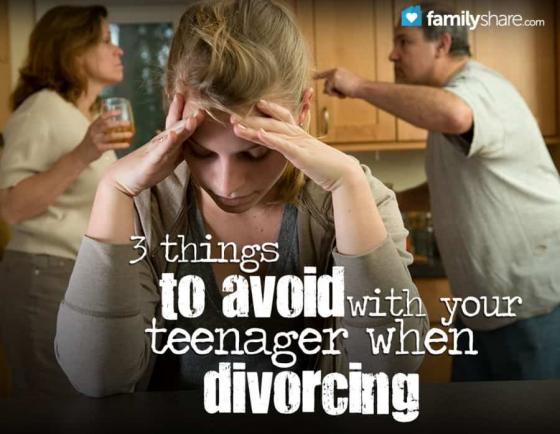
Making the decision to divorce is not an easy one, but once the decision is made there are three very important things you need to avoid when working with your children, specifically, your teenager.
Never assume that your child understands what is going on
While teenagers are often much more aware of discord in the home, they still won't have a complete grasp of details unless you tell them. It's important to be honest with your child without sharing information that will be upsetting or sensitive. Be aware that your child may ask several times and need both answers and reassurance in regards to the divorce. You will need to explain the process and how it will affect them. A child, especially a teenager, needs to understand how the choices and steps you are taking will change their life. Where will they live? When will they see the other parent? Will they have to change schools or routines? All of these questions are important to your child and you should never assume that they know what will happen with any of them.
Never put down the other parent
As divorce proceedings begin, throughout the process, and even after the divorce you should never put down the other parent, particularly in your child's presence. Your teenager won't understand complex adult relationships and the emotions behind them. They simply understand that both parents are his/her parents and he/she loves them. You need to nurture this relationship and not work to destroy it. In a divorce where parents repeatedly bash or drop insults about the other are counterproductive and very damaging to a child. Your teenager will actually internalize this dialogue and it can affect their self-worth in negative ways.
Never make your child make a choice
Make sure your child never feels like they are in a position where they have to choose between parents. While it might sound like a great idea to let your child choose which parent they get to live with after the divorce, this is a lot of undo pressure. Custody and visitation arrangements should be worked out as parents and with a mediator, if necessary, but a child should never be put on the spot to choose. After the divorce is finalized you should make sure your child has a space that is theirs with both parents so that they feel welcomed and loved at either home. When it comes times for important events, holidays, and activities you may be faced with making a decision about who attends or where your child goes. Even after the divorce, don't put this responsibility on your child. Both parents need to have some process of communicating and determining these outcomes without the weight of the decision being placed on your child. Detail it on the divorce decree or establish a relationship with a mediator to settle these ongoing concerns. Your child needs to know they are loved and valued equally by both parents.
Divorce is hard on everyone involved. Your job as a parent is to minimize the impact on your children and help them navigate the path to their new normal. You do this by being aware of the pitfalls and creating ways to avoid them whenever possible.

